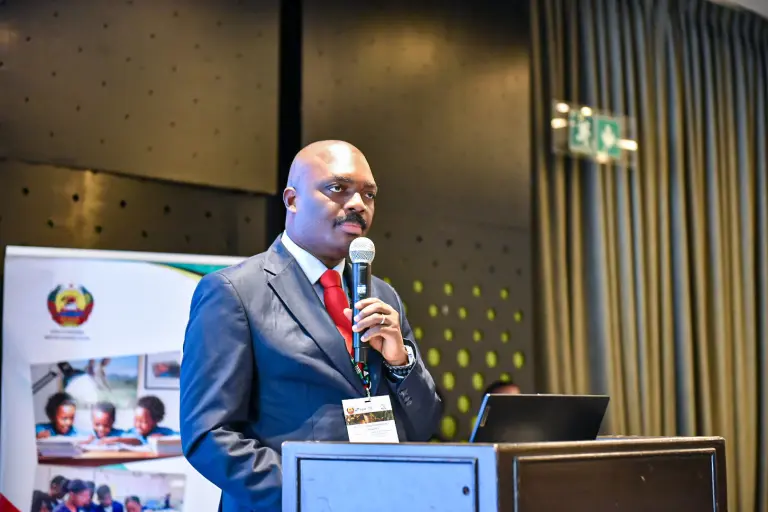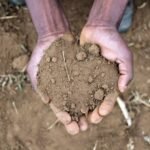Mozambique’s Secretary of State for Higher Education, Science and Technology, Dr Edson Macuacua officially opening the 2nd Annual Implementors Forum. Photo Credit: Sakina Mapenzi
By Zablon Oyugi November 19, 2025: Mozambique capital Maputo played host to a high-level gathering this week, as stakeholders from across the country’s higher education, research, and innovation sectors converged for a forum to chart a stronger course for scientific research and innovation for the nation’s socio-economic transformation.
The 2nd Annual Implementers’ Forum of the MozSkills Project, convened under the Partnership for Skills in Applied Sciences, Engineering and Technology (PASET) – Regional Scholarship and Innovation Fund (RSIF).
More than 100 participants — including representatives from universities, research institutes, industry, development partners, and regional bodies — attended. The group met under the theme ‘Strengthening Higher Education, Research and Innovation Capacity for Socio-economic Transformation in Mozambique.’
A five-year stock-take
Over the course of the forum, participants reviewed what MozSkills has achieved since its launch in 2021. The project, a partnership between the Mozambican government and the World Bank, is backed by roughly US$ 6 million.
Of that, US$ 4 million funds 40 PhD scholarships, while US$ 2 million supports 14 Mozambican-led research and innovation projects at higher education institutions across the country.
Speaking during the opening, Dr Edson Macuácua, Secretary of State for Higher Education, Science and Technology, emphasized that building a strong innovation system is essential to economic productivity.
“Knowledge alone without entrepreneurial skills to put the knowledge to productive use in the economy is not sufficient,” he said.
He added that Mozambique’s new science strategy envisions raising R&D spending to at least 1.5% of GDP — well above current levels. He also highlighted a push to create hubs of excellence: each province in Mozambique will now host a higher education institution structured around a locally relevant thematic framework to drive local innovation.
Building the innovation pipeline
According to Dr Julius Ecuru, Manager of the RSIF Regional Coordination Unit at the International Centre of Insect Physiology and Ecology (icipe), a healthy innovation system rests on three pillars: skilled, creative, and productive people; policies that promote innovation; and financing for creative ideas, research, and development.
He argued that when these three functions interact effectively, innovation ecosystems can generate new products and solutions that address society’s most pressing challenges.
Dr Ana Menezes, a senior education specialist at the World Bank in Mozambique, underlined the critical role of talent development.
“Research and innovation is key to achieving national development priorities including technical skills transfer, evidence-based knowledge sharing,” she said.
She added that the World Bank is determined to sustain support for Mozambique’s innovation agenda via public higher-learning institutions.
From the Ministry of Higher Education, Dr Calado Muinga, who also serves on PASET’s Executive Board, reiterated the government’s commitment to investing in people: “Twenty-seven per cent of students in higher education are pursuing STEM courses. Investing in education for socio-economic impact is a key pillar of our national development priorities.”
Policy, collaboration and commercialization
A key session at the forum was a panel discussion chaired by Dr Ecuru, featuring Prof Jorge Ferrão, Rector of the Pedagogical University; Prof Mouzinho Mário, from the Ministry of Education and Culture; Prof Zélia Menete, Director of the Instituto de Investigação Agrária de Moçambique (IIAM); and Mr Pedro Tomo, an innovator and founder of Gutsamba.
In their remarks, Prof Ferrão stressed the importance of aligning academic programmes with Mozambique’s development needs, and urged expansion of both university-level and technical-vocational education.
Prof Mário argued that funding mechanisms for universities should be reformed in order to incentivize stronger cooperation. Prof Menete called for deeper partnerships between universities, industry, government, and research institutions.
And Mr Tomo urged a more enabling environment, including increased investment and private sector engagement, so that promising ideas can be brought to market.
Several speakers also emphasized the need to support researchers not only in generating new knowledge, but also in translating their ideas into commercial products. That means mentoring, entrepreneurial leadership training, and building bridges between academia and the private sector.
These themes reflect findings from a UNESCO study on research and innovation in Mozambique, which recommended expanding postgraduate studies, boosting doctoral training, and institutionalizing support for industry-university linkages, incentives, and prototype development.
Sustainable innovation for development
Dr Danilo Parbato, Manager of the Institutional Development Fund (FDI), discussed the impact of MozSkills: the project has not only strengthened digital infrastructure in Mozambican universities, but has also raised teaching quality via curriculum accreditation and the creation of quality-assurance units.
On the human capacity side, MozSkills has empowered university lecturers with modern STEM teaching approaches, benefiting thousands of students and promoting gender inclusion.
The support for advanced research—through PhD scholarships and innovation grants—is helping to nurture a new generation of Mozambican scientists ready to tackle development challenges.
Parbato said the programme also helps build employability by fostering entrepreneurship, running employability workshops, and providing digital tools to marginalized students.
Looking ahead: long-term commitment
As the forum drew to a close, participants highlighted that sustainable innovation requires long-term commitment. Building talent, infrastructure, and a culture of creativity will take decades, they said — but such a foundation is vital to make science and research a real engine of economic growth.
Speakers called on scientists to play a more active role in the entrepreneurial ecosystem, bridging the gap between academic research and business. If researchers engage with industry, they can accelerate impact by turning discoveries into market-ready products, they argued.
Speaking on behalf of the Minister of Education and Culture, Dr Raquel Matavele Chisumba, affirmed that improving doctoral training is integral to Mozambique’s national agenda.
“Successful examples shared during this forum serve as inspiration for advancing our higher education systems,” she said, urging continued commitment, creativity, and collaboration.
The Maputo gathering makes clear that Mozambique is firmly on a path to strengthen its scientific and innovation capacity — not only to build new knowledge, but to translate that knowledge into sustainable social and economic development.







